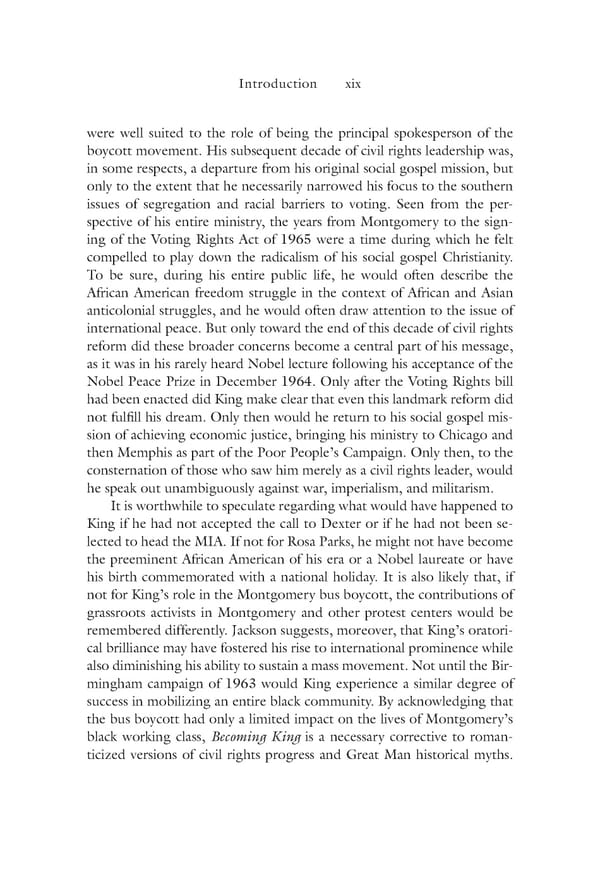Introduction xix were well suited to the role of being the principal spokesperson of the boycott movement. His subsequent decade of civil rights leadership was, in some respects, a departure from his original social gospel mission, but only to the extent that he necessarily narrowed his focus to the southern issues of segregation and racial barriers to voting. Seen from the per- spective of his entire ministry, the years from Montgomery to the sign- ing of the Voting Rights Act of 1965 were a time during which he felt compelled to play down the radicalism of his social gospel Christianity. To be sure, during his entire public life, he would often describe the African American freedom struggle in the context of African and Asian anticolonial struggles, and he would often draw attention to the issue of international peace. But only toward the end of this decade of civil rights reform did these broader concerns become a central part of his message, as it was in his rarely heard Nobel lecture following his acceptance of the Nobel Peace Prize in December 1964. Only after the Voting Rights bill had been enacted did King make clear that even this landmark reform did not fulfill his dream. Only then would he return to his social gospel mis- sion of achieving economic justice, bringing his ministry to Chicago and then Memphis as part of the Poor People’s Campaign. Only then, to the consternation of those who saw him merely as a civil rights leader, would he speak out unambiguously against war, imperialism, and militarism. It is worthwhile to speculate regarding what would have happened to King if he had not accepted the call to Dexter or if he had not been se- lected to head the MIA. If not for Rosa Parks, he might not have become the preeminent African American of his era or a Nobel laureate or have his birth commemorated with a national holiday. It is also likely that, if not for King’s role in the Montgomery bus boycott, the contributions of grassroots activists in Montgomery and other protest centers would be remembered differently. Jackson suggests, moreover, that King’s oratori- cal brilliance may have fostered his rise to international prominence while also diminishing his ability to sustain a mass movement. Not until the Bir- mingham campaign of 1963 would King experience a similar degree of success in mobilizing an entire black community. By acknowledging that the bus boycott had only a limited impact on the lives of Montgomery’s black working class, Becoming King is a necessary corrective to roman- ticized versions of civil rights progress and Great Man historical myths.
 Becoming King: Martin Luther King Jr. Page 19 Page 21
Becoming King: Martin Luther King Jr. Page 19 Page 21